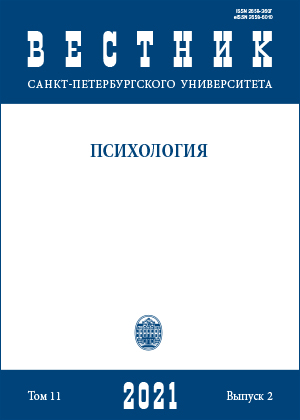Personal projects of young Russians and Spaniards: A comparative analysis
DOI:
https://doi.org/10.21638/spbu16.2021.205Abstract
This article aims to clarify the personal projects of Russians and Spaniards. It was hypothesized that the content and methods for the implementation of personal projects are determined by the main age-related tasks and cultural conditions of life. The sample of convenience consisted of young Russian (n = 102) and Spanish (n = 80) people between the ages of 18–25 years. The study focused on aspects, which were measured: importance, difficulty, visibility, control, responsibility, time adequacy, likelihood of success, self-identification, the view of others, value, involvement, competence, autonomy and duration of personal projects, and theme and transperspective of projects. The results indicated that the goal of the personal projects of young Russians and Spaniards is similar (getting an education, employment, creating a family and supporting family relations) and is determined by the main age-related tasks of youth. Furthermore, the operational meanings of personal projects and the ways of their implementation have cultural differences. The authors found that young Spaniards orient their personal projects towards opportunistic meanings and the current pandemic (COVID-19) more than in Russians (р ≤ 0.03). Furthermore, Russians choose personal projects that correspond to instrumental values in the long term more than in Spaniards (р ≤ 0.03). The level of difficulty, importance, initiative, responsibility, autonomy, self-realization, positive assessment of others in personal projects of Russians was higher than in personal projects of Spaniards (р ≤ 0.003). There was a higher level of internal resources in personal projects of Spaniards, than in personal projects of Russians (р ≤ 0.05). Therefore, a personal project of modern young people is a delayed solution to the age-related tasks of youth, and the ways of solving them are determined by the socio-cultural conditions of life.
Keywords:
personal projects, young people, family narrative, age task, meaning, Russians, Spaniards, COVID-19
Downloads
References
Downloads
Published
How to Cite
Issue
Section
License
Articles of "Vestnik of Saint Petersburg University. Psychology" are open access distributed under the terms of the License Agreement with Saint Petersburg State University, which permits to the authors unrestricted distribution and self-archiving free of charge.




